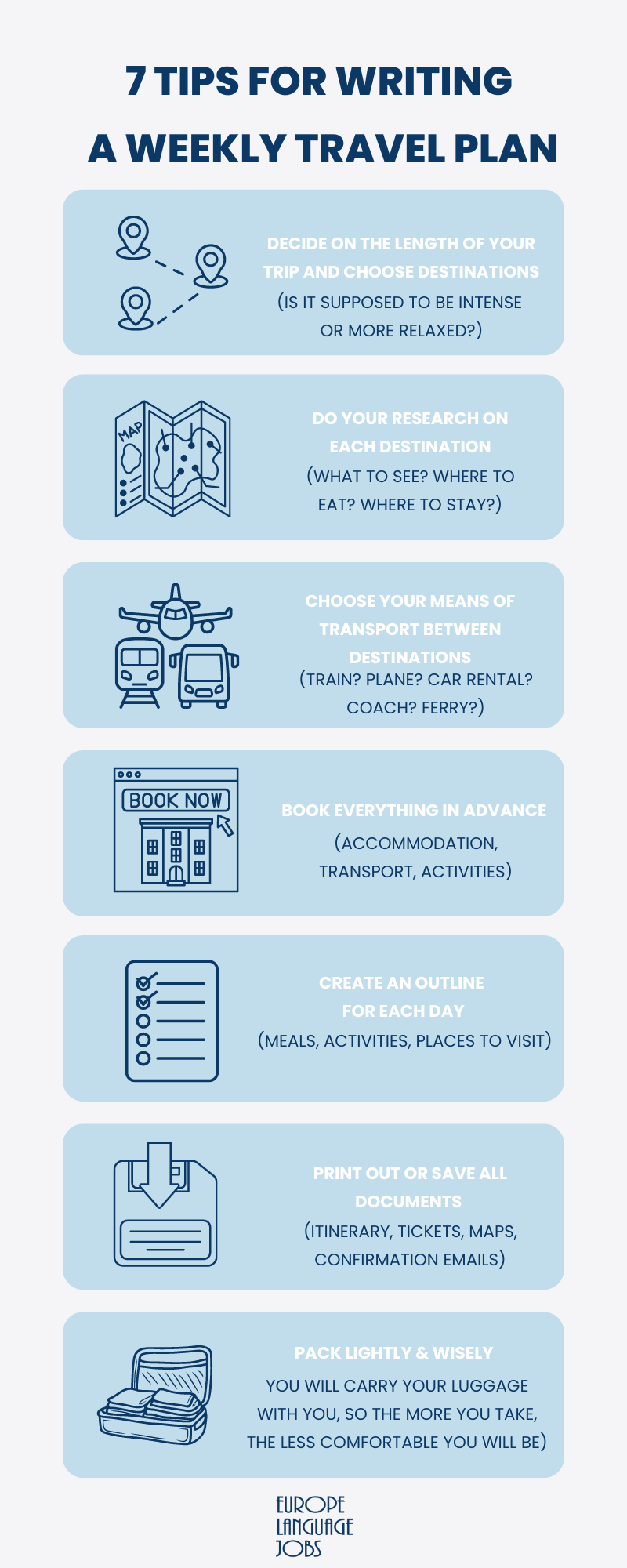Are you dreaming of traveling around Europe, taking in the sights and sounds of different countries each week? Would you like to find a way to make it happen that does not become too stressful or overwhelming? With some careful planning and consideration, creating a weekly travel plan for your European adventure can be incredibly rewarding.
According to statistics, 48% of travelers make their reservations for activities when they get to their destination. But if you prepare ahead of time, you will not only save money and time but also avoid unnecessary stress. Before you start packing your bags, you need to create a weekly travel plan.
1. What is a Weekly Travel Plan?
2. The Top Eight Benefits of Having a Weekly Travel Plan
3. How Do You Write a Weekly Travel Plan?
4. Places to Include in a Weekly Travel Plan for a Trip to Europe 2025
What Is a Weekly Travel Plan?
A weekly travel plan is a detailed itinerary that lists all the things you want to do, places to stay, and places to go during a particular week. It keeps you organized and provides you with a preview of your journey before you arrive at your destination.
By enabling you to make reservations or bookings in advance rather than waiting until you arrive at your destination, this kind of plan can also help you save time, money, and stress. You can make sure that every day of your trip is jam-packed with exciting activities while remaining manageable and stress-free by making a weekly travel plan.
The Top Eight Benefits of Having a Weekly Travel Plan
Having a weekly travel plan provides many benefits:
-
It allows you to plan and efficiently organize your travels;
-
It can help you save time, money, and stress by ensuring that all the necessary preparations for each leg of your journey are made in advance;
-
It reduces the risk of unexpected delays or unforeseen expenses;
-
It helps ensure all members of the traveling party are aware of any changes or cancellations throughout the trip;
-
It will allow you to enjoy your journey more, as you will know what to expect ahead of time rather than being met with surprises along the way;
-
It helps reduce stress and anxiety by alleviating worry about missing an important connection or transportation option;
-
It provides travelers with the opportunity to save money by taking advantage of booking discounts and avoiding costly last-minute changes;
-
Planning ensures travelers make the most of their time while on vacation, as they will not have to waste any precious moments trying to figure out what to do next.

Here are some tips to help you write a travel plan for your European travel that will make the most of your time and money:
1. Decide the Length of Your Trip and the Destinations in Europe You Want to See
2. Do Some Research on Each Destination
3. Plan Your Transportation Between Cities
4. Book Your Accommodation, Transportation, and Activities for Each Destination
5. Create an Outline of Each Day’s Activities, Including Breakfast, Lunch, and Dinner
6. Print Out or Save Copies of Your Itinerary, Maps, and Other Important Documents

#1. Decide the Length of Your Trip and the Destinations in Europe You Want to See
Traveling through Europe is a wonderful way to experience a variety of fascinating cultures and histories, but selecting the locations you want to visit can be difficult. However, choosing them beforehand and planning the length of your trip will make travelling so much more enjoyable.
Think about it this way: if you were writing an essay, you'd create a plan for it beforehand. Then, you would probably do thorough research, use a variety of spell checkers, and run it through a plagiarism checker to ensure you receive the best mark.
The same care should be applied when writing a weekly travel plan. Nobody will mark it, but how well it's prepared will influence how organised and pleasurable your trip will be. The more effort you put into it, the bigger the chances of avoiding stressing and improvising later on.
The first thing you should do is decide whether you want an exciting or relaxing vacation before you do anything else. Decide how long you want your trip to be after that. Do you have a full month to explore during the summer break, or are you taking two weeks off?
When planning your route, it is helpful to organize and rank cities according to their importance. When planning the ideal itinerary for your ideal European getaway, do not forget to leave plenty of time for exploring each destination.

#2. Do Some Research on Each Destination (What Are the Must-See Attractions, Restaurants, and Hotels?)
Research is key. You should do the same thing when planning a trip as students do when choosing the writing service – visit dozens of review websites to get the needed data and choose the best destination. Doing a bit of research on the region before you book could save you time and money:
-
Check online review sites like TripAdvisor or Fodor's for exciting attractions and must-see attractions;
-
Familiarize yourself with Yelp or Zomato for ordering takeout or making reservations at trendy eateries;
-
Search Booking.com or Airbnb for great accommodation, all of which have ratings to give you an idea of what to expect.
Doing your due diligence in researching your destination will ensure that you will have the best possible experience while still saving some extra cash.

#3. Plan Your Transportation Between Cities (Flights, Trains, Buses, Etc.)
An essential step when traveling is to plan your transportation between cities. Although flights are frequently chosen as a default option, they can be expensive.
Trains and buses can be a cheap way to travel, depending on where you are going and how far, and they sometimes have beautiful scenery to see along the way. And if you are looking for a truly unique experience, consider renting a car.
It will allow you the freedom to travel at your pace and stop at some interesting places that might not be accessible by other means of transportation. Therefore, no matter what your route entails, there is unquestionably something for everyone to experience.

#4. Book Your Accommodation, Transportation, and Activities for Each Destination
Booking your lodging, transportation, and activities should be one of the first steps in your trip planning for Europe. It will help relieve stress during the trip because you will not have to worry about finding lodging or an available rental car.
Furthermore, planning your activities will guarantee that you do not skip any of the local attractions. To fully immerse yourself in the local culture when you arrive, be sure to thoroughly research each destination before you leave for your trip and make online reservations for all necessary items.

#5. Create an Outline of Each Day’s Activities, Including Breakfast, Lunch, and Dinner
Even though organizing a trip to Europe can be intimidating, you can make it simpler by taking the time to make a schedule of your daily activities. Choose your breakfast, lunch, and dinner before you even get out of bed.
It will ensure that your meals are nourishing and won't make you feel ravenous afterward. Making decisions based on the customs and cultures of the area will also be beneficial because there may be particular cuisines or foods that are typical for the region.
It will be much less stressful and give you more time to concentrate on organizing exciting activities for your trip if you have this basic outline in place before leaving.

#6. Print Out or Save Copies of Your Itinerary, Maps, and Other Important Documents
When you travel, there are numerous details to remember, such as what to pack and where to go. Printing or saving copies of your itinerary, maps, and other important documents is one of the most crucial steps you can take to guarantee a smooth trip.
It might also contain details about any tours or activities that need to be pre-booked, such as confirmation emails for hotel reservations, restaurant reservations, and attraction tickets. You will not need to stress about where you will find the information in the middle of your journey if you have it written down or stored on a device, giving you easy access to everything you need.

#7. Pack Lightly and Wisely – Remember That You Will Be Carrying Everything with You
It is best to bring only what is necessary and to pack lightly. Saving money can also come from not overpacking, as many airlines charge more depending on how much each bag weighs.
Carrying too many items around could be inconvenient when traveling to several places or using public transportation, which frequently has space restrictions. When traveling from one place to another, bring along comfortable and useful items.
Choose thoughtful clothing that has lots of pockets and can withstand any weather or climate changes throughout your trip. Remember that fewer bags on hand will make things more practical and convenient, regardless of how simple or difficult traveling is supposed to be.
Places to Include in a Weekly Travel Plan for a Trip to Europe 2025
Planning a trip to Europe in 2025 can seem overwhelming at first, but breaking it down into weekly chunks makes the experience much more manageable. Start your weekly travel plan with a trip through London, England, where you can explore the historical sites of Westminster Abbey and Stonehenge.
From there, travel to Paris, France, to experience its iconic monuments like the Louvre and Eiffel Tower. Do not forget to take day trips outside of the city to other nearby gems such as Giverny for Monet’s gardens or Versailles for its ornate palace surrounded by stunning French grounds.
Across the channel lies Madrid in Spain, full of history, art, and architecture from its days as one of Europe’s many royal cities. Enjoy tapas with friends while exploring Granada’s rich heritage before hitting the beaches of the Costa del Sol, located a few hour drive away.
Then, visit Rome, Italy, with its vibrant nightlife, breathtaking cathedrals, and delicious food. Following that, head north to experience Prague in Czech Republic’s rich culture and visit some ancient monuments before returning home filled with memories.
Conclusion
Writing a weekly travel plan has many benefits, from helping to save time and money to reducing stress and anxiety. You will be well on your way to creating a fantastic weekly travel plan that can help make your trip more pleasurable and less stressful if you adhere to these seven suggestions.
You can quickly create a fantastic travel itinerary that will enable you to make the most of your trip with a little planning and a few useful tools.
Feeling inspired? Visit our blog for more career advice! How can you be sure the information we provide is top-notch? We are a group of professionals working with recruiters, career coaches, and HR specialists from all over the world!
Trust our experience and let us help you find a new job in Europe!















Sandra Calvo Paíno1y ago
Thank's for the advice!
Thank's for the advice!